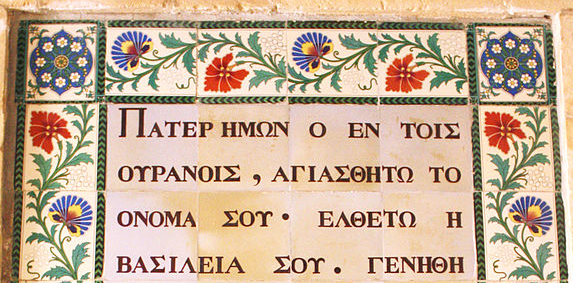This article belongs to the “Studying the Lord’s Prayer with Brad Young” series. For an overview of the entire series, click here.
Luke’s version of the Lord’s Prayer does not contain the expression שבשמים (she·ba·sha·MA·yim, “who is in heaven”), but simply records “Father.” Luke’s Gospel never refers to God as the “father who is in heaven.” Matthew, in contrast, preserved twelve sayings of Jesus in which he used the Jewish expressions “our father who is in heaven,” “your father who is in heaven,” and “my father who is in heaven.” Mark also used the idiom “your father who is in heaven” (Mark 11:25). Evidently, Luke felt he had to change the expression for his Greek-speaking readers.
In Luke 11:13, according to the best textual reading, Luke wrote, “The father will give the holy spirit out of heaven….” Other manuscripts read “heavenly father….” But Matthew’s version has the Jewish idiom that probably is the one Jesus used: “…your father who is in heaven…” (Matt. 7:11).
These words are filled with rich Hebrew imagery. They describe the disciple’s relationship to God, but do not neglect his connection to the family of God.
Paid Content
Premium Members and Friends of JP must be logged in to access this content: Login
If you do not have a paid subscription, please consider registering as a Premium Member starting at $10/month (paid monthly) or only $5/month (paid annually): Register
One Time Purchase Rather Than Membership
Rather than purchasing a membership subscription, you may purchase access to this single page for $1.99 USD. To purchase access we strongly encourage users to first register for a free account with JP (Register), which will make the process of accessing your purchase much simpler. Once you have registered you may login and purchase access to this page at this link:
































































































Comments 4
The Greek word “Ouranois” is plural. Hence the translation should be “Our Father who is in the heavens”, or metaphorically “everywhere”.
I’m not sure that the equation “heaven = everywhere” is valid. Scripture makes a distinction between heaven and earth.
The Orthodox Church would agree with your comment, as is shown here from a book by Fr Thomas Hopko of the Orthodox Church in America:
The statement that the Father is “in heaven,” or literally “in the heavens,” means that He is everywhere and over all things. The heavens are over all and encompass all. Wherever man goes on the earth or in the air, or even in space, the heavens are around him and over him. To say that the Father is “in the heavens” means that He is not tied down or limited to any one location—as were the gods of the heathens.
But then why bother saying “your will be done on earth as it is in heaven” if “in heaven” means everywhere? Doesn’t “your will be done on earth as it is everywhere” sound nonsensical? It does to me.
Or does everything hinge on the plural form of the noun? Heavens = everywhere, heaven = heaven? If so, is it wise to hang too much meaning on the Greek form of a noun when the Greek form of the prayer is merely a translation? In Hebrew and Aramaic “heaven” is always plural, so the distinction between heavens = everywhere vs. heaven = heaven wouldn’t apply in the form of the prayer Jesus taught his disciples.